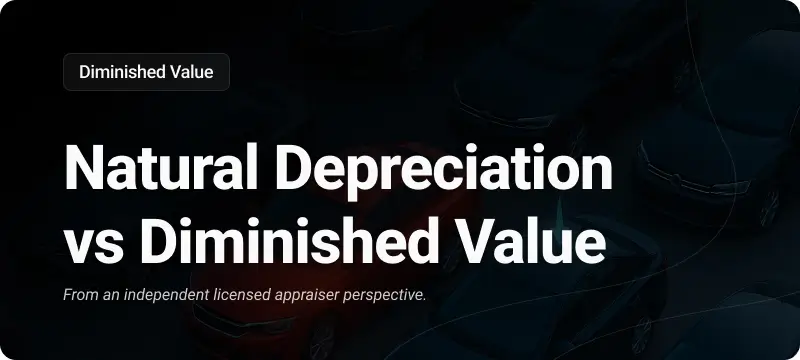
When you buy a car and drive it off the lot, you already start losing value. That is natural depreciation. But if your car is in an accident, even after perfect repairs it may still be worth less than it was before the accident, that gap is called diminished value (DV).
At Diminished Value of Georgia, we often get asked: “If my car was already depreciating, does that mean I can’t claim diminished value?”
The short answer: No.
Depreciation and diminished value are two different things. Depreciation reflects time and use; diminished value reflects damage history. This guide explains how they intersect, what Georgia law allows, and how we isolate the real loss you can recover.
What is Natural Depreciation?
Natural depreciation refers to the predictable decline in a vehicle’s value over time. Key drivers include:
- Age and mileage. The more years and miles, the lower the value.
- Wear and tear. Tires, brakes, interior, exterior showing use.
- Model and market. Some makes/models hold value better than others.
- Obsolescence. Newer technology, features, fuel economy standards, and consumer preferences can shift value.
For example: in many cases a new car may lose 20-30 % of its value in the first year, up to 50 % by year three, then decline more slowly.
Important: Depreciation affects all vehicles — whether they’ve been in an accident or not.
What is Diminished Value?
Diminished value is the reduction in market value a vehicle suffers because it has been in an accident (or damaged) and repaired, even if it is repaired well. The key here is the accident history or damage record.
Types of DV commonly cited include:
- Inherent diminished value: value lost simply because the vehicle shows an accident history, even if repair was perfect.
- Repair-related diminished value: value lost due to visible or hidden damage, inferior parts, or substandard repairs.
- Immediate diminished value: the immediate drop in value just after the accident, before repair.
DV is fundamentally different from depreciation.
How Depreciation & Diminished Value Interact
Because both depreciation and DV reduce a vehicle’s value, confusion is common. Here’s how they relate:
- Depreciation is expected and built into market values over time.
- Diminished value is unexpected and caused by a damage event.
- If you are making a DV claim, the baseline (pre-accident value) already reflects depreciation up to the accident date. What you are claiming is the additional loss due to the accident.
- Depreciation does not wipe out a DV claim, but it may affect the baseline and how much value remains.
For example: an older, high-mileage car may have less “upside” (less value to lose) so the DV figure may naturally be lower vs a near-new low-mileage vehicle.
Does Depreciation Reduce Your DV Claim?
In Georgia, when you file a first-party property damage claim (collision, comprehensive) under your own policy, you’re entitled to recover both the repair cost and diminished value when present. There is no legal offset requiring you to deduct natural depreciation simply because you owned the car. (However, when negotiating with carriers, depreciation may appear as a factor in their valuation).
Key takeaways for Georgia motorists:
- Keep your pre-accident condition documented: mileage, maintenance, ownership.
- A vehicle with heavy mileage or older age doesn’t eliminate DV, it affects how high the baseline value was and what a buyer would pay.
- Your appraisal should isolate the loss from the accident (DV) from the decline that would have occurred anyway (depreciation).
Carriers may argue “well it was depreciating anyway”, but the appraiser’s role is to show what the value would have been at the accident date absent the event, and then what it is now, thus quantifying the damage-related loss.
Expert Tips to Navigate Depreciation Issues
- Document mileage & condition at accident date. The lower mileage and better condition, the stronger your baseline.
- Use current comps. Look for comparable vehicles (make, model, year, mileage, condition) that have not been in an accident to build the “would-have been” value.
- Separate variables. Your argument should clearly state: “Here is the normal depreciation curve; here is the extra loss due to the accident.”
- Focus on marketability. Often DV is driven by buyer reluctance, not just condition. A car about to decline may still suffer a DV because of stigma.
- Act quickly. Waiting lets depreciation, mileage and other wear accumulate — reducing the argument for the “pre-accident” baseline.
- Educate the carrier. When adjusting, an insurer may cite a lower value due to age/mileage — you can push back by showing that depreciation is separate from the accident-history discount.
Common Misconceptions & Carrier Defenses
- “You shouldn’t get DV because the car was already depreciating.”: The true issue is how much value was lost beyond normal decline.
- “The accident caused the depreciation, so we’ll reduce it”: Carriers may argue a damaged car speeds decline; valid angle but they must still isolate the accident effect.
- “Depreciation rate equals DV rate.”: Wrong. A car may depreciate 15% per year, but DV could be a one-time additional 5-20% (depending on damage, stigma, market, etc).
How Diminished Value of Georgia Treats Depreciation
At DVGA we build appraisal reports that:
- Establish a clear pre-accident value based on market, condition, mileage, and age.
- Model the normal depreciation curve up to the accident date.
- Quantify the accident-related loss (DV) separately from that curve.
- Produce a defensible number with comps, condition photos, repair invoices and trend data.
- Provide carriers and attorneys a clear “but-for” scenario: But-for the accident, this would have been the value, now it’s this. The difference is your DV.
We don’t subtract “natural depreciation” from your claim simply because it’s old, we ensure the loss is properly contextualised.
Conclusion
Natural depreciation is part of car ownership. But when your vehicle is in an accident, the value lost because of that accident is distinct, and you deserve a fair evaluation of that loss. If your insurer or adjuster is bringing up age or mileage to reduce your payout, you don’t have to settle for that.
Get your free diminished value estimate today from Diminished Value of Georgia, upload your repair/invoice/offer, and we’ll show you how much value you should be owing, how depreciation factors in, and what your negotiation position looks like. It takes only a few minutes, and you’ll gain clarity before you sign away your rights.


